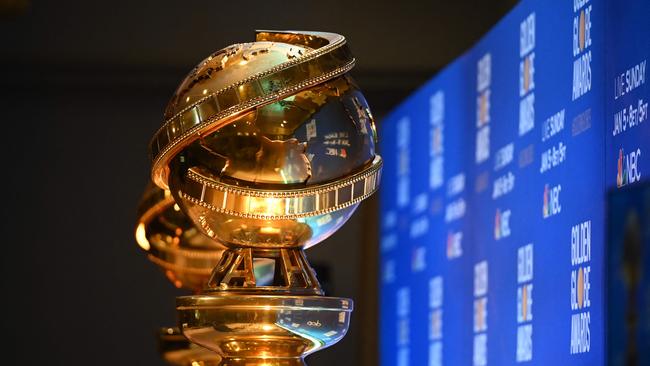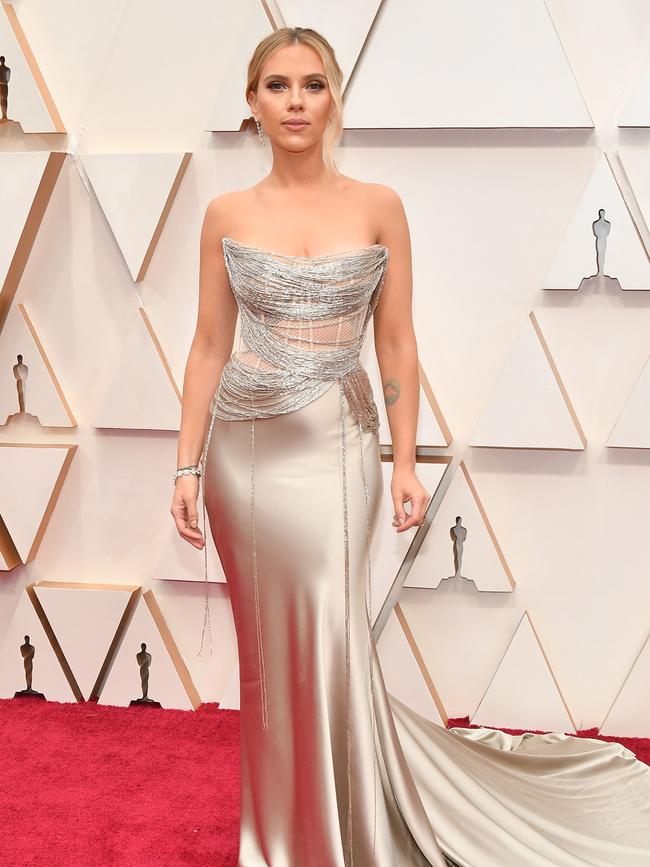Can the cancelled Golden Globes awards regain their lustre?
Tarnished by a diversity scandal, questions are being asked about whether the Golden Globes will continue.

In 1972, David Stratton was invited by the Hollywood Foreign Press Association – the small, opaque but highly influential group of international journalists that runs the Golden Globe Awards – to a Los Angeles screening of a film, Young Winston, about the early life of Winston Churchill.
Stratton, then the Sydney Film Festival director, was also invited to a HFPA lunch for the film’s director, Richard Attenborough, and cast members including Simon Ward, Anne Bancroft and Robert Shaw. At the lunch, Stratton, now a film critic for Review, “was struck by the speciousness of the alleged accreditation of many HFPA members. I talked to a woman who claimed to represent a Romanian journal, but she hadn’t been in Romania since the war, and the journal she wrote for certainly wasn’t published in that country.
“Similarly, there was a Russian journalist who had lived in Los Angeles since the Revolution in 1917 yet claimed to be representing Russian media.” Although HFPA members are meant to be professional foreign correspondents, the people Stratton met “were mostly expats whose writing on film, if it was published at all, was certainly not published in their homelands. They were also notable for the inane questions they asked of the filmmakers. Attenborough was polite and patient, but Shaw, Irish and clearly quick-tempered, could barely contain himself.”
Stratton’s story adds an amusing local perspective to the litany of complaints about the professionalism, diversity and ethics of HFPA that culminated this month in an effective boycott of the organisation and the Golden Globes – until recently, the most watched screen awards after the Oscars.
In a bombshell announcement, host broadcaster NBC, which has aired the Globes ceremony since 1996, cancelled next year’s Golden Globes, insisting on the need for “meaningful reform”. In a symbolic protest, Tom Cruise returned his three Golden Globes, while Scarlett Johansson complained that HFPA press conferences could involve remarks that “bordered on sexual harassment”. Netflix, Amazon Studios, WarnerMedia and Hollywood publicity firms representing the movie industry’s biggest stars also declared they wouldn’t play ball with HFPA until the organisation lifted its game.

The boycott – the biggest crisis in HFPA’s already chequered history – was sparked by media revelations the group had not had a black member among its 87-strong roster of Globe-voting journalists for 20 years, along with other claims of alleged professional and ethical lapses.
Now, questions are being asked about whether the association and the Globes, first held in 1944, will survive. Stratton says bluntly: “I don’t think they deserve to survive – there are already more than enough awards ceremonies.’’ The former festival director and film critic says if HFPA does outlast this crisis, it “can only survive if it genuinely consists of journalists and film writers who regularly contribute to legitimate media in the countries they’re supposed to represent”.
But Damian Trewhella, chief executive of Australia’s key film and television awards, the AACTAs, (Australian Academy of Cinema and Television Arts awards), says the Globes can be “as important and impactful as they have been in previous years if they are open to listening to the criticism landed against them and … initiate change”.
Pressure started building on HFPA this year after it gave the popular but lightweight Neflix series Emily in Paris two Golden Globe nominations ahead of the critically lauded, black-led drama I May Destroy You. It soon emerged that in 2019 more than 30 HFPA members had flown to the French capital to visit the Emily in Paris set and were put up by Paramount at the five-star Peninsula Hotel. (Other journalists, reportedly including a representative from the Los Angeles Times, which exposed HFPA’s lack of black members, also attended the Paris junket.)
Across the decades HFPA’s sometimes eccentric Globes picks have stoked concerns about perks potentially influencing members’ award choices: in 1982 actress Pia Zadora took home a Golden Globe for her performance in the widely panned film Butterfly after HFPA members were flown to Las Vegas by her billionaire husband.
Despite this, a HFPA spokesman tells Review the embattled organisation can “absolutely” recover from the crisis and become a model of “diversity, transparency and accountability”. He says HFPA members agree reform is “long overdue” and that their immediate priority is recruiting black and other racially diverse journalists. In its belated bid for “transformational” change, the association has voted to increase its membership by 50 per cent, adopt a new code of conduct and appoint a new board. They will also loosen the stipulation that HFPA members must live in southern California – a rule that clearly limited its recruitment pool.
But Hollywood advocacy group Time’s Up (which is, ironically enough, embroiled in its own sexual harassment scandal) slammed these reforms as “window-dressing platitudes”.
The drive to reform high-profile screen awards that can turbocharge actors’ careers or a film’s box-office take is not confined to the Golden Globes – in recent years, the Oscars, British Academy Film Awards and AACTAs have all responded to demands to boost their gender and cultural diversity.
In 2016, the AACTA awards’ red carpet was besieged by feminists dressed as sausages denouncing the ceremony as a “sausage fest”. Today, however, Trewhella says “inclusivity and diversity are vital to the future of awards organisations”.
In recent years, says Trewhella, AACTA has reduced “barriers to membership and voting by allowing entry-level creatives” to sign up and has introduced new categories such as best indie film to capture “new and independent voices”. During the past three years, this award has gone to casts featuring disabled, Asian and Afghan actors.
Previously under-represented female directors also have gained ground, with Jennifer Kent (The Nightingale) and Shannon Murphy (Babyteeth) each taking out AACTA’s two biggest accolades – best film director and best film – at the 2019 and 2020 awards respectively.
AACTA has 3500 members (51 per cent male and 49 per cent female), and voting (apart from specialist craft categories) is open to all of them.
Now, the awards body is taking a further step towards greater diversity. For this year’s awards, says Trewhella, there will be a mandatory “stipulation in all awards entries” requiring filmmakers to list how “your production has attempted to address the representation and inclusion of a diverse range of voices either through story, themes, cast or crew”. Entrants’ answers, he says, will provide a snapshot of the local industry’s cultural, gender, sexual and geographical diversity and will “inform” AACTA’s future policies on how to champion diversity.
In stark contrast is the lack of cultural diversity among AACTA’s executive team, board and ambassadors: The CEO (Trewhella), chair (Alan Finney), president (Russell Crowe), vice-president (Nicole Kidman), patron (George Miller), ambassador (Cate Blanchett) and the other eight board members are all white. Moreover, one industry source, who declines to be identified, points out that under AACTA rules, only two board members are elected by members and often have shorter terms than the appointed directors. “There are seven directors who can never be voted off (by members) and some keep voting each other on,’’ the source claimed, adding that at times, “what you’ve got is a cabal’’.
Trewhella denies this, pointing out that four board members have been elected or appointed over the past two years, while AACTA was “very fortunate to have some long-standing, committed members’’ to fill its voluntary, unpaid board roles. Two long-time board members, George Souris and Robert Sessions, resigned last year, but this has yet to be “noted” on AACTA’s website, the CEO says.
Asked about the lack of cultural diversity among AACTA’s leadership and board, Trewhella promises change is on the way: “Outreach has commenced and we expect to have some news on this in due course.’’
Asked about the diversity problem among AACTA’s leadership and board, Trewhella promises change is on the way: “Outreach has commenced and we expect to have some news on this in due course.”
Interestingly, for all the condemnation HFPA has attracted, it is more diverse than many Hollywood institutions, with a membership that is 58 per cent female and more than 30 per cent non-white. While some members write for obscure publications, others file for respected outlets including Der Spiegel, Vogue Paris, Rolling Stone and AFP.
This year, the two most prestigious Golden Globe film acting accolades went to black actors (Andra Day and the late Chadwick Boseman), while the Oscars’ biggest acting gongs went to white veterans Anthony Hopkins and Frances McDormand.
Federica Polidoro is one of few commentators willing to defend HFPA. Writing in the Italian edition of Vanity Fair, she argues it is an organisation of immigrants and that “it is difficult to find African envoys (correspondents) residing in southern California”. She says that given they are the “most followed” event of the awards season after the Oscars, “many realise that suspending the Golden Globes will backfire on the system”, already struggling with Covid-19 shutdowns and the reality cinema is becoming “more of a niche interest”.
Others are asking searching questions about Hollywood’s hypocrisy and why it tolerated HFPA’s alleged misdeeds for so long. Sam Asi, a HFPA member who works for BBC Arabic, has said it is “bizarre” that Hollywood is “suddenly shocked” about HFPA’s lack of black members “when this has been the case for 20 years … It’s a political game.” He has been in Hollywood for 15 years but has never met a black publicist – and publicists can be powerful people in the film enclave.
Film writer Scott Roxborough argues that “NBC cancelling next year’s awards broadcast does smack of opportunism – ratings for the 2021 Golden Globes were down 60 per cent – but it will have an impact … Change is long overdue. The only question is whether the group can reform before Hollywood cancels them entirely.”
Writing for the DW news website, Roxborough reveals that since the late 1990s publicists, studio executives and producers have complained to him about the Globes and HFPA: “But … the group and the rest of Hollywood were engaged in a marriage of convenience. As long as the Globes remained a shiny shop window for studios to present their new products, everyone was willing to ignore what was behind the curtain.”


To join the conversation, please log in. Don't have an account? Register
Join the conversation, you are commenting as Logout